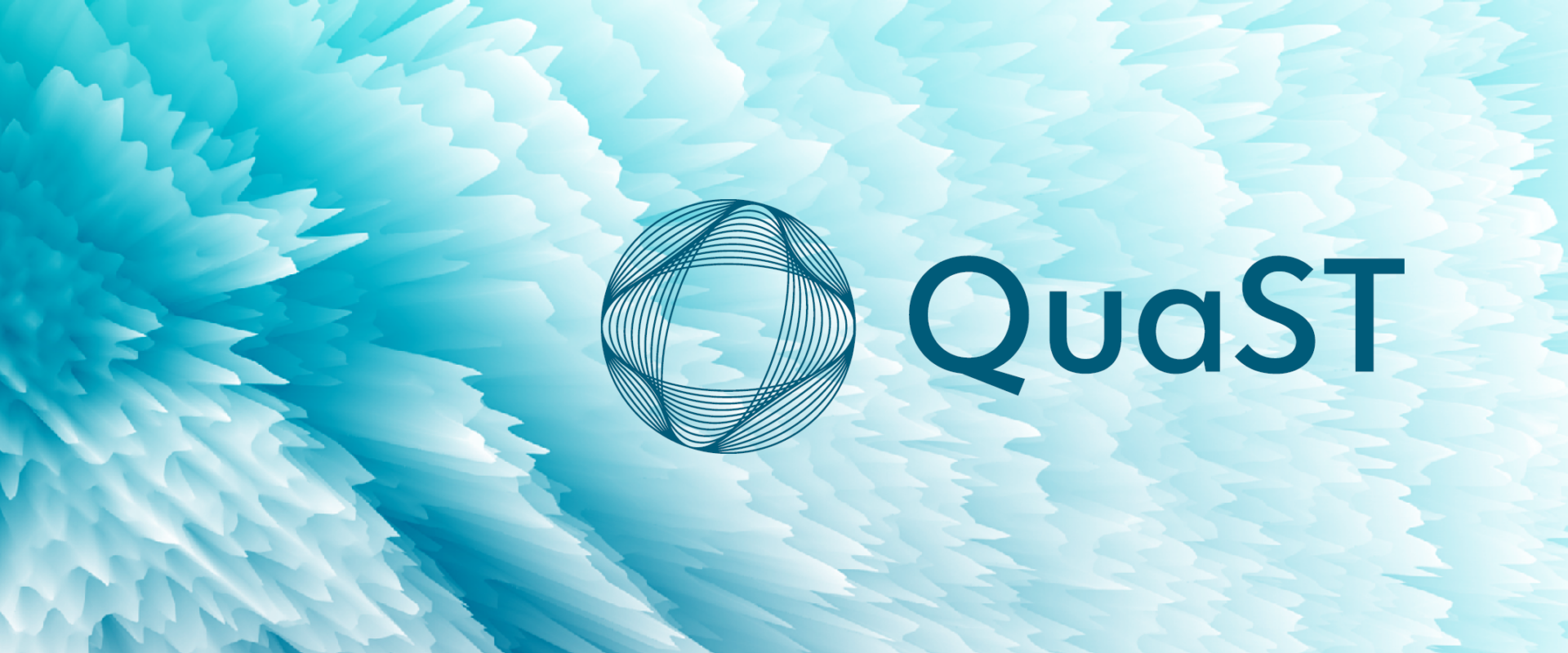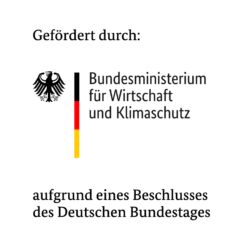
Quantum-enabling services and tools for industrial applications (QuaST)
The QuaST project offers small and large companies low-threshold access to quantum computing.
Safe and reliable quantum applications
In the research consortium “Quantum-enabling Services and Tools for Industrial Applications” (QuaST), ten project partners worked to facilitate access to quantum computing for small and large companies. This is because solutions based on quantum computing (QC) can make a significant contribution to the advancement of industrial optimization problems, thereby saving time and money.
However, QC-based solutions are not yet available for mainstream industrial users. This is not only due to the limits of quantum computing hardware, but also because in-depth knowledge of physics and computer science is required in order to program today's quantum computers. There has been a lack of low-threshold access to QC-supported solutions for end users.
Easy access to quantuum computing for companies
The QuaST project conducted research and developed tools to provide low-threshold access to quantum computers for companies of all sizes. From 2022 to 2024, it gathered seven partners from science and industry to tackle this problem within the problem domain of combinatorial optimization. Industrial end users should be able to obtain easily accessible and reliable QC-supported solutions for their application problems with minimal knowledge of QC hardware and QC software.
Throughout the three project years, several cornerstone application cases have been investigated with numerous methods from the literature and within the consortium. The QuaST Best Practice Guide gathers the enormous expertise gained within QuaST and with the joint effort of over 30 researchers and experts from industry and contains key results of over 20 publications.
The QuaST project, funded by the German Federal Ministry for Economic Affairs and Climate Action, brought together expertise from several Fraunhofer Institutes, the Department of Informatics at the Technical University of Munich (TUM), the Leibniz Supercomputing Centre (LRZ), hardware/software co-design expert IQM, the QC operating system expert ParityQC and the application partners Infineon and DATEV. The project was led by the Fraunhofer Institute for Cognitive Systems IKS.

The QuaST Best Practice Guide
The consortium presents the results of its work in the QuaST Best Practice Guide.
Download the complete guide or read the executive summary below.
Six key findings of the QuaST project
A quantum advantage for general NP-hard combinatorial optimization problems is unlikely. Therefore, QuaST brings together partners from science and industry to investigate specialized quantum-enhanced solutions tailored to specific industrially relevant use cases.
From investigating several applications from logistics to energy networks and software verification, the project extracted six key findings. These provide a general direction in which research around quantum-assisted algorithms for combinatorial optimization should be pursued.

- As of today, there is no quantum advantage (exponential, polynomial, or pre-factor) for general industrially relevant optimization problems. Promising avenues include adapting algorithms to specific problems. This requires testing and benchmarking against specific classical algorithms. Software tools that integrate the different parts of the solution process are necessary to aid the search for some quantum usefulness. They enable intermediate-scale testing and benchmarking and finding solution paths that can inspire fully productive solvers.
- Out-of-the-box solutions with variational quantum algorithms (VQA) need problem-specific adaptions to produce useful results.
- Modeling industrial problem settings requires much effort and introduces manual overhead. Within QuaST, we have expanded the range of use cases to translate into QC-enabling models. The QuaST decision tree is a tool specifically designed to reduce the expertise and manual work in handling industrial optimization problems.
- For quantum computing in the noisy intermediate-scale quantum era, handling complex constraints is challenging. Effective and efficient encodings for quantum-enhanced algorithms with a good ratio of feasible solutions within the search space are a key ingredient to successful quantum-assisted algorithms.
- Unspecialized or metaheuristic classical optimization methods have troubles finding good parameters in QC loss landscapes. We must develop strategies for finding good parameters for parameterized quantum circuits (fixed angles, good initialization, tweaked optimizers). Some of these strategies have been advanced within the QuaST project.
- VQAs produce bitstrings that exhibit high volatility. The correlations extracted from quantum algorithms are more stable than the bitstrings obtained directly from sampled VQA outputs, showing promising results (e.g., in algorithms like Relax-and-Round and QUBO shrinking) and are a possible path forward in the search for beneficial use of quantum information.
Navigating the Complexities of Quantum-Enhanced Combinatorial Optimization
It is part of a realistic view on combinatorial optimization to emphasize how difficult it is to find good solutions for optimization problems with quantum-enhanced methods. Every step of the solution process needs to be highly optimized in dependence of each other, including classical parts and the quantum-classical interfaces and transfer points.
Choosing an algorithm and improving its performance with problem-specific adaptions are crucial steps in successfully applying quantum computing to industrial use cases. With the vast array of algorithms available, this can be a daunting task requiring extensive expert knowledge in different fields such as physics, mathematics and computer science. Even with the right algorithm, its performance is significantly impacted by the choice of hyperparameters, optimization methods, and penalty factors. Thus, a holistic view on the entire solution pipeline is encouraged.
To navigate these complexities and allow for a systematic exploration and algorithm setup, the QuaST project partners have developed the QuaST decision tree. This software framework guides users through the process of selecting and improving an algorithm, and provides a structured approach to answering key questions about the problem, algorithm, and optimization strategy, ultimately leading to suitable choices for specific use cases.
The QuaST Decision Tree
The QuaST decision tree gathers, simplifies, organizes and automates the many decisions on the path from the application to a quantum-enhanced solution. The treelike modular structure can be use interactively with the user providing necessary input, making the choices freely or accepting the recommendations fed to the decision tree by configurable subroutines (e.g., penalty selection). The flexible and modular framework can take over any computational task necessary for the solution of optimization problems. Different modules can be incorporated as “recommendation engines” and may include even commercial software. Thus, the QuaST decision tree can provide interfaces to any application-facing optimization routine.

From the beginnings of the QuaST project, the consortium has worked towards establishing the needs of end users and researchers. The first concept of the QuaST decision tree framework indeed dates from the first half of the project. With further research, the initial layout has been tested and revised for stability, flexibility and robustness. The ultimate project result is a unified, light-weight software framework that will undergo further development beyond the QuaST project. It can cover all necessary functions from the application to the invocation of the hardware, with its basic nodes including:
- Problem Loading:
Load a problem from a simple JSON file or generate a random instance of predefined problem classes. - Encoding:
Encode the problem directly or via an intermediate encoding-independent step into a QUBO formulation. For constrained problems, this includes penalty factor selection. - Algorithm Selection:
Select a variational quantum algorithm, or generate a comparison benchmark with basic classical methods such as Tabu sampling or even a brute-force approach. - Hyperparameter Selection:
Tune the algorithm by choosing the necessary hyperparameters such as the depth and type of the ansatz, mixer Hamiltonian etc. - Backend Selection:
Choose a simulator backend or, depending on your access, a real quantum computer to send the problem to.
The decision tree provides recommendations in the form of default options for its choices and provides the necessary framework for automating the algorithm building process at various levels. It is set up specifically to allow for any community member to add their own recommendation routines, methods etc. With its modular approach, all information pertaining to the problem instance can be easily modified, pre- and postprocessed. The software is in an alpha stage with an ever-growing set of features like batch handling, decomposition steps and the inclusion of specialized methods from within the QuaST project. Further developments include the integration with various software stacks such as the Munich Quantum Portal allowing for a combined access of quantum computing and conventional high-performance computing resources.
Want to learn more? Then read the complete QuaST Best Practice Guide.
The project partners
- Fraunhofer-Gesellschaft zur Förderung der angewandten Forschung e. V. (FhG) with the Fraunhofer institutes IKS, AISEC, IIS und IISB
- Technical University of Munich (TUM)
- Leibniz Supercomputing Centre of the Bavarian Academy of Sciences and Humanities (LRZ)
- IQM Germany GmbH
- Parity Quantum Computing Germany GmbH (ParityQC)
- Infineon Technologies AG
- DATEV eG
Project sponsor: German Aerospace Center (DLR)











More information
The QuaST Best Practice Guide
In the Best Practice Guide, you will find the results of this research project – summarized compactly for you.
“Companies will be able to benefit from quantum computing“
The “QuaST” (quantum-enabling services and tools for industrial applications) project, led by Fraunhofer IKS, is now underway. Jeanette Lorenz, Department Head Quantum-enhanced AI at Fraunhofer IKS, heads the project. In this interview, she explains what QuaST is all about.
Solve difficult problems easily - but reliably!
Quantum computing still has the reputation of being a very experimental cutting-edge technology, and yet Fraunhofer IKS is working to harness its immense potential for industry. One example of this is the QuaST project.
It's crunch time: QuaST in the final stretch
How can companies leverage the advantages of quantum computing—regardless of their size and with minimal effort? The partners involved in the QuaST project, which is now entering its final year, are developing methods to achieve this.
Contact

PD Dr. habil. Jeanette Miriam Lorenz
Department Head Quantum Computing at Franhofer IKS
Hansastr. 32
80686 Munich
Phone +49 89 547088-334
This project was supported by the Federal Ministry of Economic Affairs and Climate Action (BMWK) based on a resolution of the German Bundestag.

